Showcase your research at the Falling Walls Lab MSCA 2025 pitch competitions
06/05/2025

Collaboration of research teams from different organizations in different countries is one of the major benefits of the EU Framework Programme for Research and Innovation. The Framework Programme makes a significant contribution to international scientific research cooperation within Europe. The EU Regulation 2021/695 of the European Parliament and of the Council of 28 April 2021 establishing Horizon Europe – the Framework Programme for Research and Innovation – states in Article 2, inter alia, that "the Programme should support the creation, better diffusion and transfer of high-quality and excellent knowledge and high-quality technologies in Union,…, facilitate collaborative links…” And Article 5 states that “… while respecting the principle of excellence, the Programme should aim to strengthen,…, collaborative links in Europe thereby contributing to reducing the R&I divide.” One of the specific objectives of Horizon Europe is literally "... to facilitate collaborative links in European R&I."
The topic of cooperation of research teams from the Czech Republic with foreign organizations has been addressed for a long time – e.g., Albrecht [1] in the 7th Framework Programme (2007–2013) dealt with the cooperation of Czech teams with 15 top European research institutions. Frank [2] in the same programme used social network analysis to assess institutional participation. Cooperation between EU Member States in Horizon 2020 projects (2014–2020), the intensity of cooperation between EU Member States and leading European research institutions, and the relationships between Czech participants in the programme were examined by Frank in his interim report on the Czech Republic’s participation in Horizon 2020 in the period January 2014–May 2018 [3, pp. 52-56]. This is also the case on a smaller scale in the 7th (final) report on the Czech Republic’s participation in Horizon 2020 [4, p. 85-87].
Europe's leading research organizations
As of 23 April 2024, the European Commission's eCORDA database recorded 3.4 thousand projects (with 53.8 thousand registered participations) coordinated by 1.3 thousand organizations in Pillar II 'Global Challenges and European Industrial Competitiveness'. We deal exclusively with Pillar II because it thematically addresses the main environmental, societal and economic challenges facing the EU today and to which research consortia are trying to contribute. The total net EU contribution to participants in Pillar II projects amounted to €21 billion, of which €4.1 billion was claimed by the coordinating institutions. Spain (212 organizations coordinating 542 projects), Germany (175 organizations coordinating 395 projects), Italy (148 organizations coordinating 370 projects) and France (147 organizations coordinating 305 projects) reported the highest number of coordinating organizations (see the map diagram below).
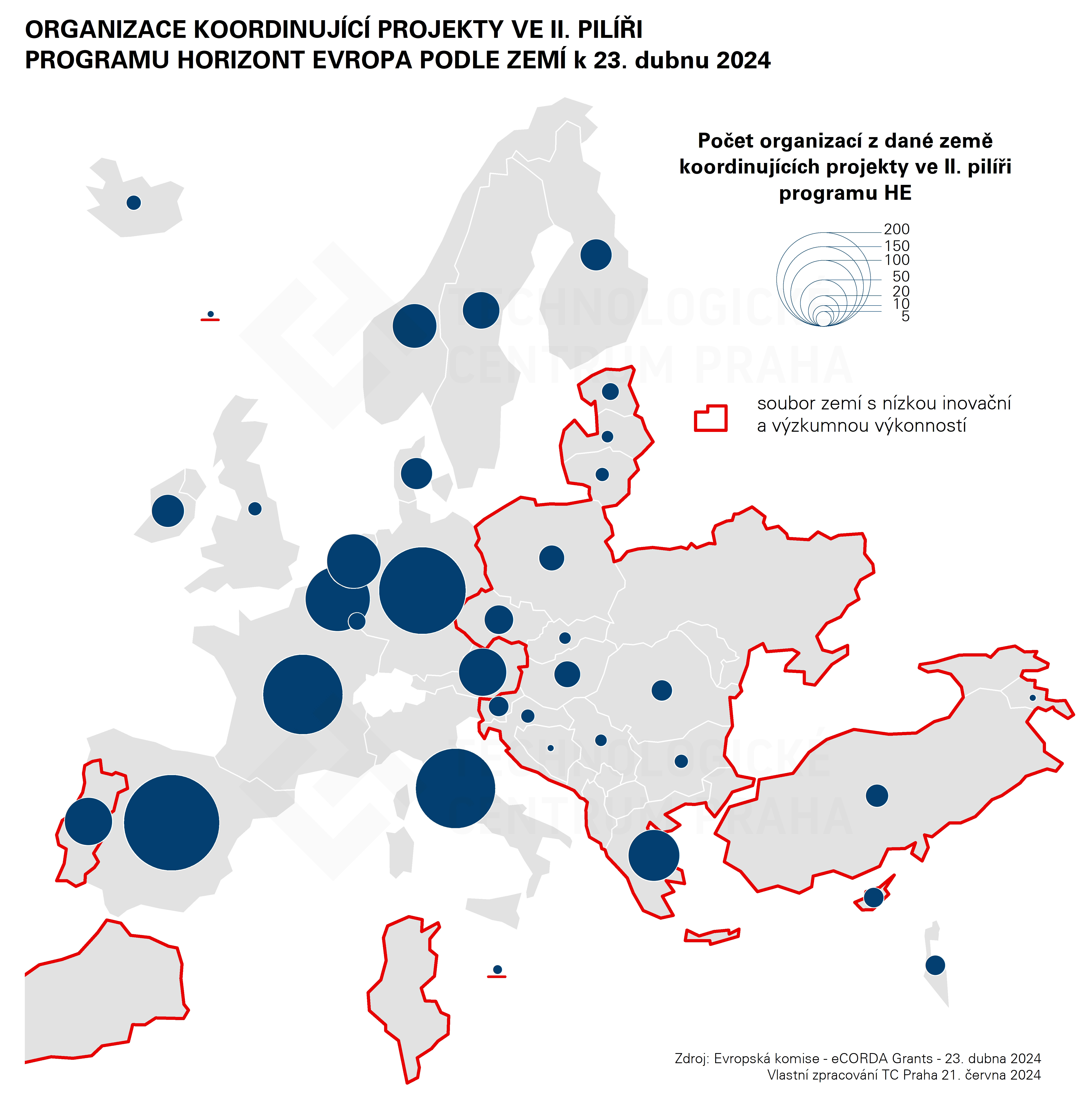
Note: Horizon Europe Pillar II project coordinating organizations by country as of 23 April 2024
Legend: Number of organizations from a particular country coordinating projects in Pillar II of the Horizon Europe programme. Widening countries in red outline.
Source: European Commission – eCORDA Grants – 23 April 2024. TC Prague’s own preparation 21 June 2024.
31 European organizations reported 15 or more project coordinations. The coordination of Pillar II projects generated a total of €823 million for these organizations (Table 1). The total value of the projects coordinated by these 31 organizations in terms of net EU contribution amounts to €4.5 billion. These organizations were mostly from Greece (6 organizations coordinating 151 projects). 4 organizations each were reported by France (85 coordinations), Italy (78 coordinations) and Spain (77 coordinations). The aim of this paper is to investigate the extent to which Czech organizations cooperate with these top 31 organizations in the Horizon Europe programme.
The list of leading European organizations dealing with/coordinating FP projects remains essentially unchanged. The coordinating organizations listed in Table 1 of the present paper are also listed in Table 1 of Albrecht's paper [1]. The only difference is the absence of UK and Swiss institutions due to the UK leaving the European Union and Switzerland's position as a third country in relation to Horizon Europe. This makes it difficult for Czech as well as other European organizations to collaborate with world-leading institutions such as the Universities of Cambridge, Oxford or Edinburgh, University College London or the ETH Zurich and EPFL.
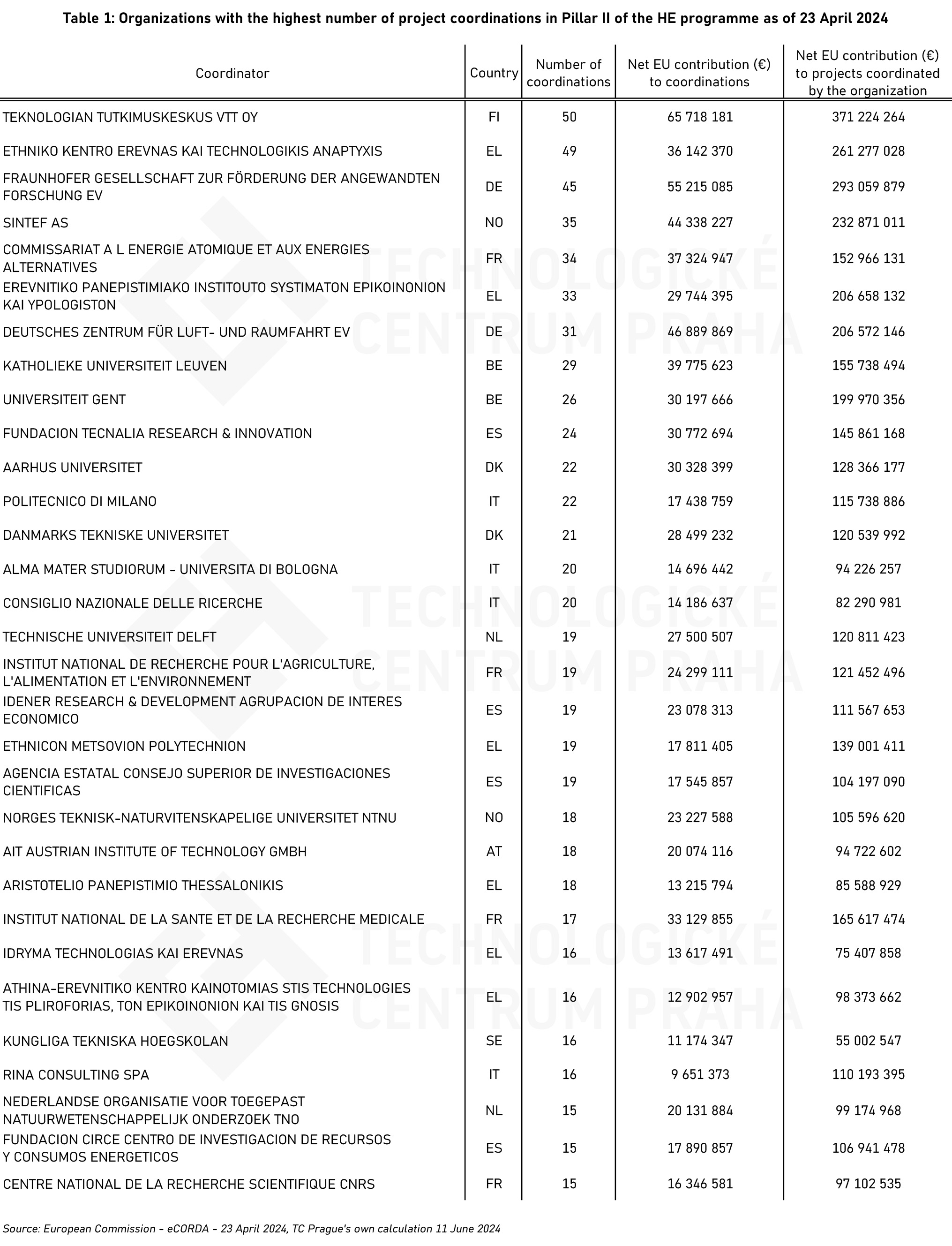
19 Czech organizations register 28 project coordinations in Pillar II of the HE programme. These organizations will not be evaluated at this time. We are interested in knowing in which consortia the Czech organizations are involved as participants. We also distinguish the legal form of the Czech organizations.
Higher education institutions
Under Pillar II of the HE programme, as of 23 April 2024, Czech higher education institutions, as participants, were involved in 186 research consortia. Their coordinators managed projects with a total value of €1.6 billion (in terms of EU contribution). Czech higher education institutions claimed €63.5 million of this as participants.
The largest number of Czech higher education institutions were involved in consortia led by coordinators from Germany and Italy (24 projects each), followed by Spain and France (19 projects each). In terms of specific types of coordinating organizations, higher education institutions (82 projects) and research institutions (67 projects) were the most represented. 16 foreign organizations coordinated 2 projects where a Czech higher education institution was involved (Table 2). Another 8 foreign organizations coordinated 3 projects where a Czech higher education institution was involved. 13 of these foreign coordinators were among the 31 organizations with the highest number of coordinations (Table 1).
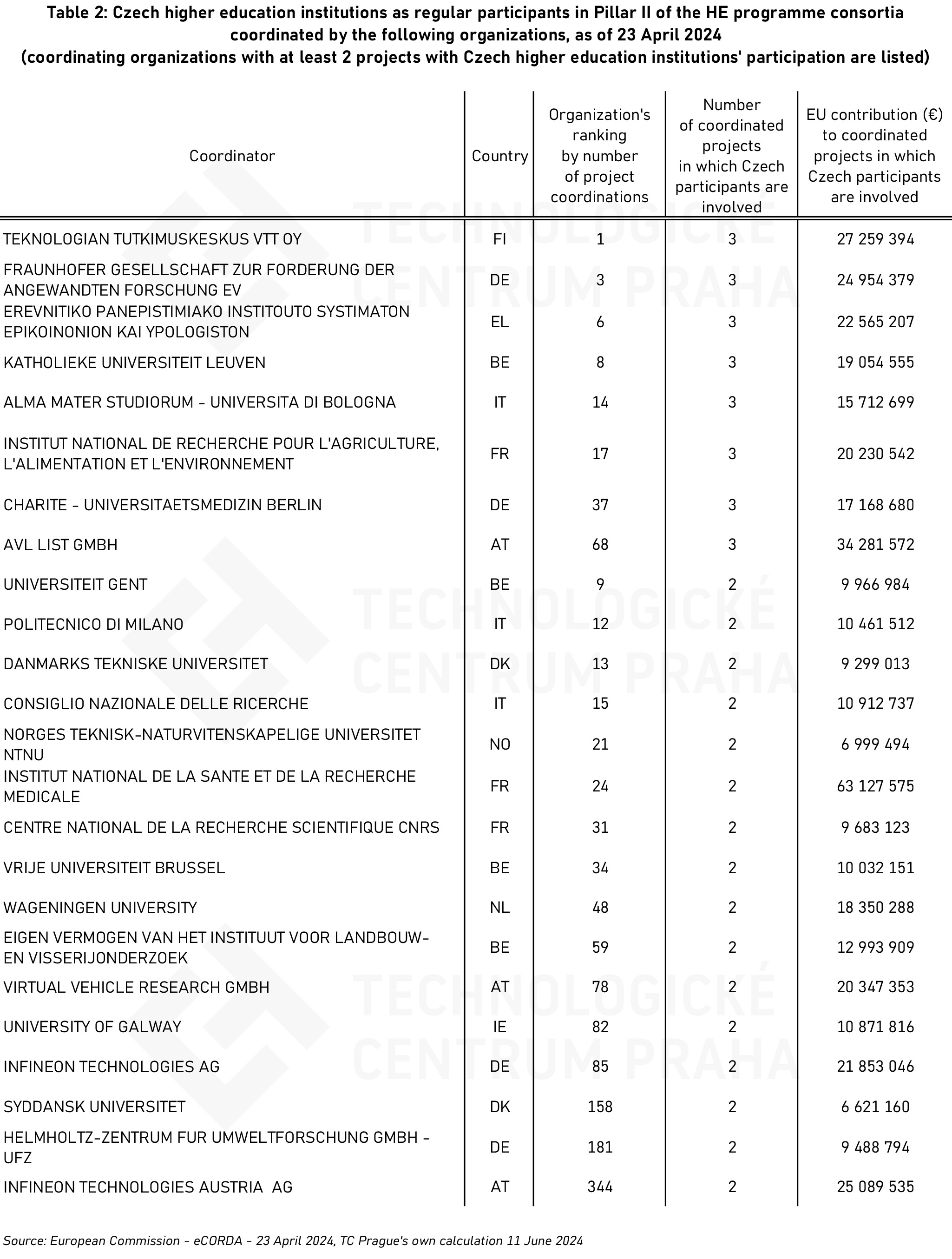
Research institutions
As of 23 April 2024, Czech research institutions were involved as participants in 90 consortia in Pillar II of the HE programme. The value of these 90 projects together amounted to €840 million (in terms of EU contribution). The net EU contribution claimed by Czech research institutions in these projects was €22.2 million.
Most of the Czech research institutions were involved in consortia led by Dutch, Italian and German coordinators (10 projects each). In 9 cases, Czech research institutions were involved in consortia led by French coordinators. In terms of legal form, research organizations (39 projects) and higher education institutions (32 projects) were the predominant coordinators. In 5 cases, Czech research institutions were involved in consortia coordinated by the Italian Agency for the Promotion of European Research (APRE), and in 3 cases each by consortia led by the Dutch Wageningen University, the German Fraunhofer-Gesellschaft and the Greek Foundation for Research and Technology – Hellas (FORTH) (Table 3).
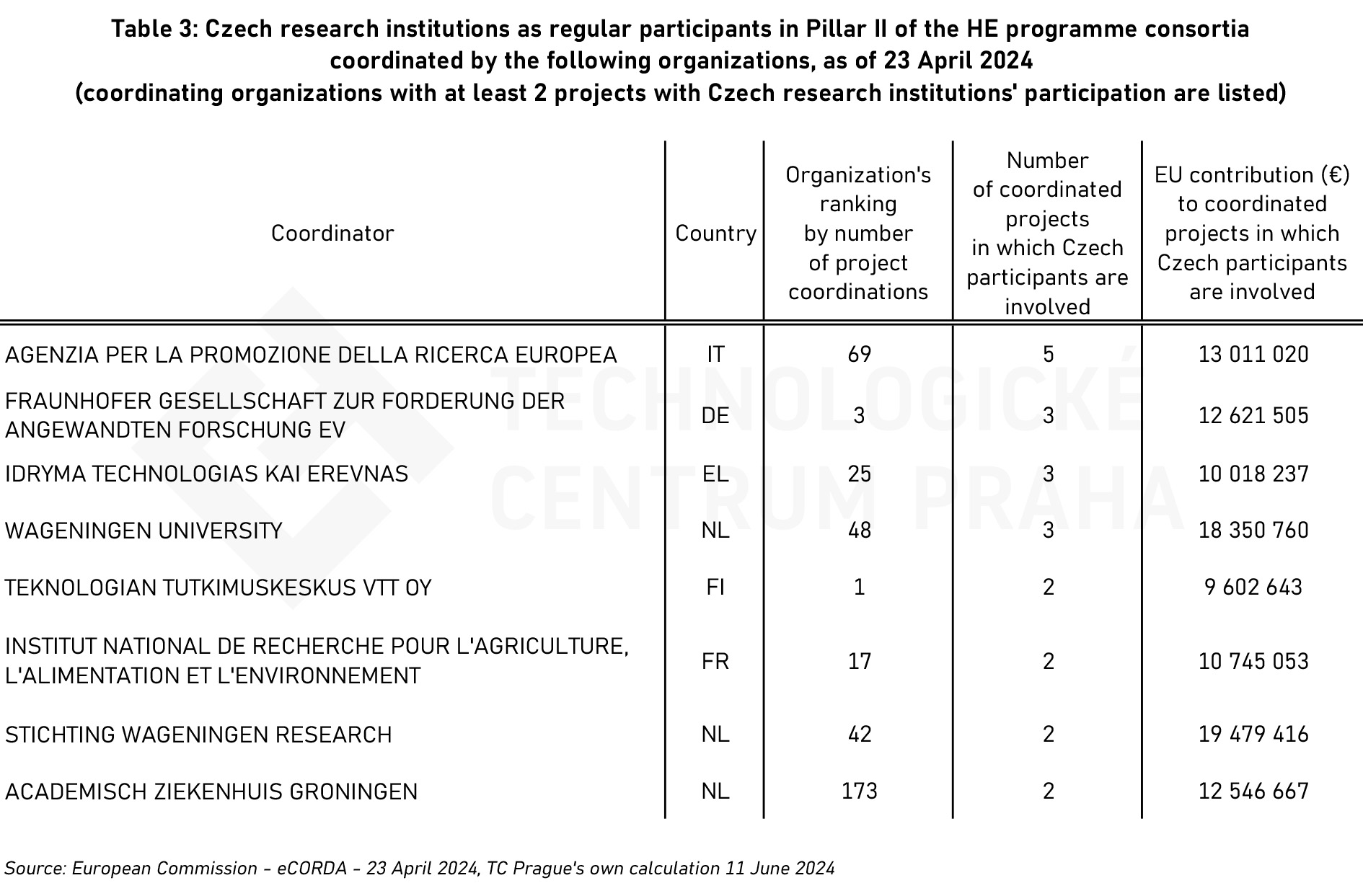
Private for-profit companies
Czech companies were involved in 157 consortia as participants in Pillar II of the HE programme. These consortia were mostly coordinated by German (22 projects), French (21 projects), Spanish (19 projects) and Italian (15 projects) organizations. In terms of legal form, Czech business participants were coordinated by research institutions (62 projects) and to a similar extent by businesses (47 projects) and higher education institutions (43 projects). The total value of the projects managed by these 157 coordinators amounted to €1.3 billion (in terms of EU contribution). Czech enterprises, as participants, claimed a net EU contribution of €57.9 million.
In terms of particular organizations, 14 coordinators had a Czech enterprise represented in 2 projects (Table 4). A further 6 coordinators had a Czech enterprise represented in 3 projects. These include e.g. the University of Bologna or the German Aerospace Centre (DLR). Four coordinators had a Czech company represented in 4 or 5 projects. This is the case of the VTT Technical Research Centre of Finland or the German Fraunhofer-Gesellschaft – those institutions reported the 1st and 3rd highest number of project coordination in Pillar II of the HE programme. Of the 24 coordinators mentioned (Table 4), 15 were among the 31 organizations with the highest number of coordinations.
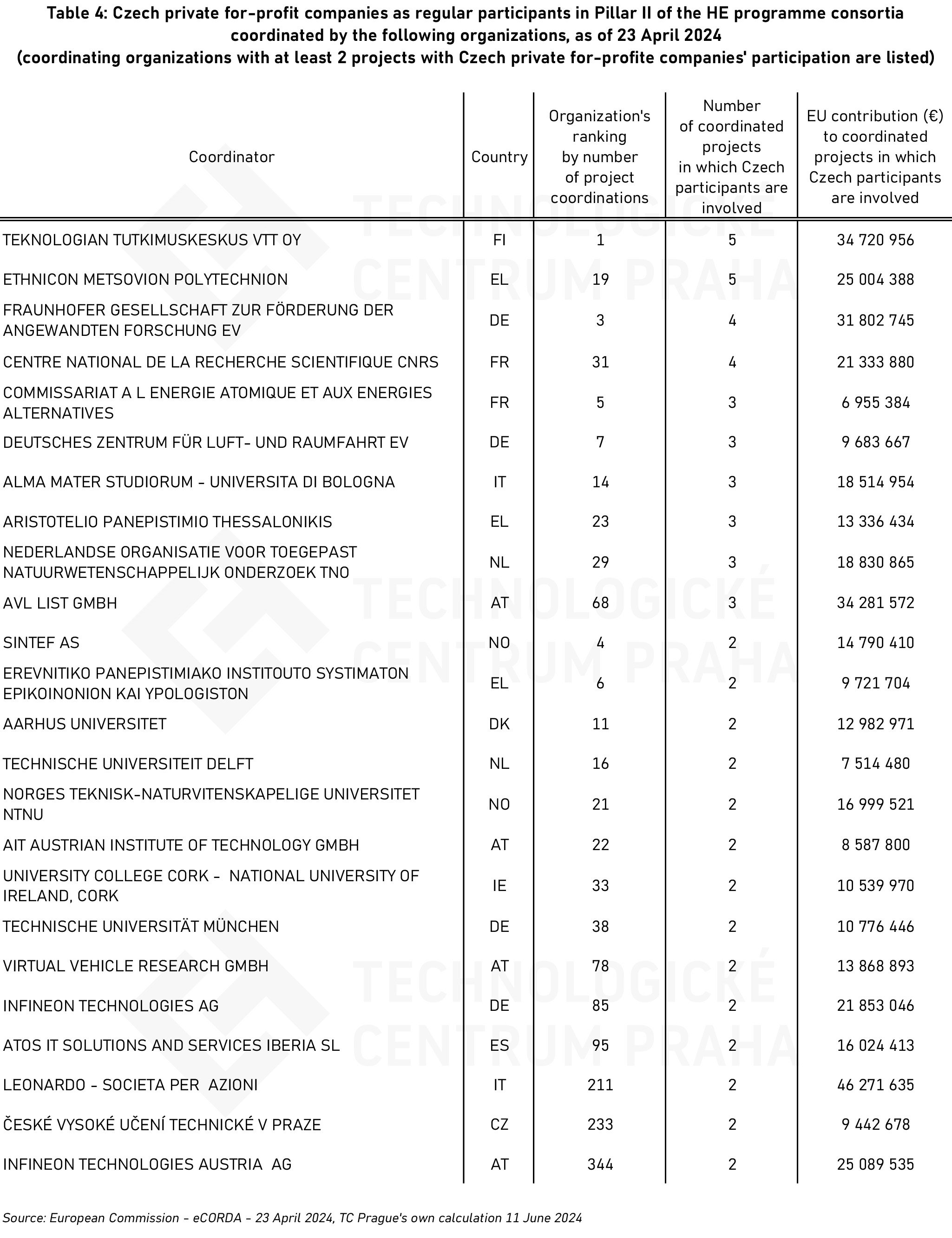
Summary:
Czech higher education institutions and companies in particular are involved in consortia led by leading European research organizations. It is the formation of international partnerships, active involvement in international scientific cooperation and the contribution of Czech participants to the results achieved therein that (in addition to the benefit of EU funding for research, development and innovation) are important benefits of Czech participation in the HE programme. 43 coordinating organisations (out of 1,320) registered at least 2 projects under Pillar II of the HE programme with the participation of a Czech higher education institution, research institution or enterprise. Another 248 coordinating organisations registered one project with Czech participation. Most Czech organisations participate in consortia led by German, Italian, Spanish and French coordinators. The most frequent coordinating institutions are research institutions or higher education institutions.
Literature:
Prepared by: Vladimír Vojtěch, TC Prague, vojtech@tc.cz, 27.06.2024
06/05/2025
04/05/2025
02/05/2025